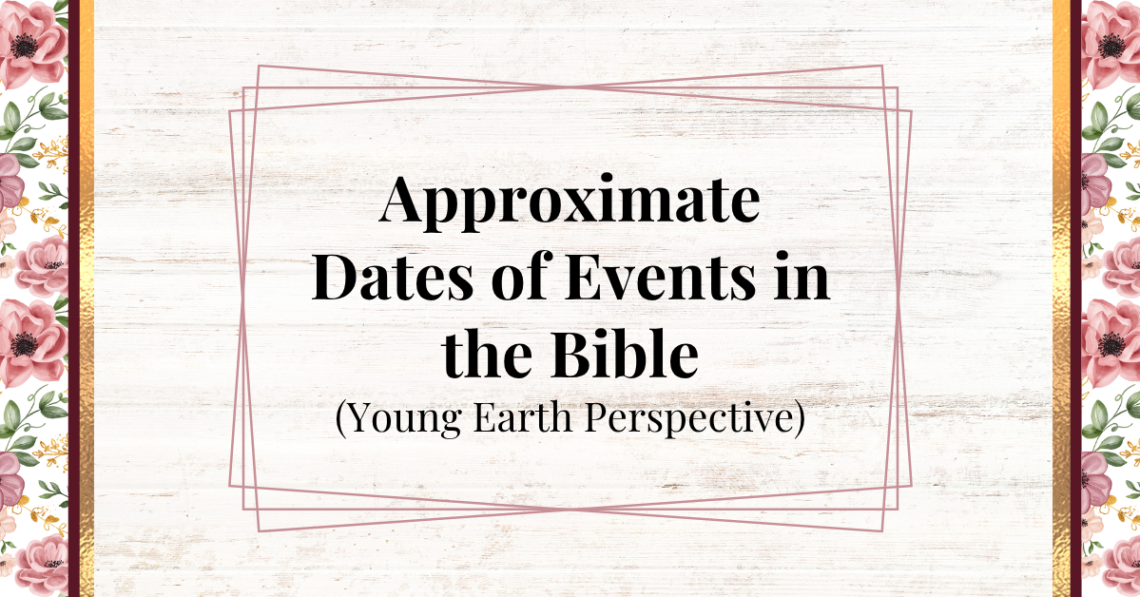The Bible isn’t just a collection of spiritual stories—it’s a historical document. From Genesis to Revelation, Scripture outlines a timeline of real people, real events, and real dates. If we believe God’s Word is true, then we can trust that the events recorded happened in time and space. But when did they happen?
Using Scripture and a young earth creation timeline (which interprets the Bible’s genealogies and events literally), we can outline a rough timeline of the major moments in biblical history. This post will walk you through some of the most significant events in the Bible and their approximate dates according to a young earth view, which holds that the Earth is about 6,000 years old.
Let’s dig in!
Why a Young Earth Timeline?
Young earth creationism holds that:
- The universe and Earth were created in six literal 24-hour days (Genesis 1).
- The genealogies in Genesis 5 and 11 are complete and can be used to date early history.
- Scripture is accurate in both spiritual and historical content.
- The global flood was a real, catastrophic event, not a myth or regional flood.
By starting with Scripture and counting forward using genealogies and major events, we can create a rough biblical timeline.
The Timeline of Major Biblical Events
Here’s a simplified list of key events in biblical history with approximate dates from a young earth point of view:
1. Creation of the World — c. 4000–4114 BC
Based on genealogical records (especially from Genesis 5 and 11), the creation of Adam is estimated to have occurred around 4000 to 4114 BC. Archbishop James Ussher famously dated Creation to 4004 BC, a date still used by many young earth supporters. This date marks the beginning of time, the heavens and the earth, and all life.
2. The Fall of Man — Shortly After Creation (c. 4000 BC)
Adam and Eve’s sin in the Garden of Eden (Genesis 3) marks the beginning of human rebellion and the entrance of death and suffering into the world. While we don’t have an exact year, it likely occurred shortly after their creation.
3. The Global Flood — c. 2348 BC
According to Genesis 6–9 and the genealogies in Genesis 5, Noah’s Flood occurred roughly 1,656 years after Creation, placing it around 2348 BC. This was a global flood that reshaped the earth’s surface and wiped out all humanity except Noah’s family.
4. The Tower of Babel — c. 2247 BC
The confusion of languages at Babel (Genesis 11) happened within a century after the flood. Many scholars place this around 100 years post-flood, or c. 2247 BC. This explains the origin of nations and language groups.
5. Call of Abraham — c. 1921 BC
God calls Abram (later Abraham) in Genesis 12 to leave Ur and follow Him. This begins the story of the Israelite people and God’s covenant promises. Ussher places this call at 1921 BC.
6. Joseph in Egypt — c. 1728–1611 BC
Joseph is sold into slavery in Egypt and rises to power (Genesis 37–50). His story helps explain how the Israelites came to live in Egypt. The Exodus timeline is used to backtrack these dates.
7. The Exodus — c. 1491 BC
One of the most well-known events in the Old Testament, the Exodus from Egypt (Exodus 12–14) is traditionally dated by young earth scholars to 1491 BC, based on 1 Kings 6:1 which says the Exodus happened 480 years before Solomon’s temple was built.
8. The Ten Commandments at Mount Sinai — c. 1491 BC
Shortly after leaving Egypt, Moses receives the Law at Mount Sinai (Exodus 19–20). This was a defining moment for the Hebrew people, shaping their identity and relationship with God.
9. Conquest of Canaan — c. 1451 BC
After 40 years of wandering, Joshua leads the Israelites into the Promised Land (Joshua 1). The conquest and division of Canaan begin around 1451 BC.
10. United Kingdom of Israel (Saul, David, Solomon) — c. 1095–975 BC
- Saul becomes Israel’s first king around 1095 BC (1 Samuel).
- David reigns from 1055–1015 BC.
- Solomon reigns from 1015–975 BC and builds the temple.
11. Divided Kingdom Begins — c. 975 BC
After Solomon’s death, the kingdom splits into Israel (north) and Judah (south) (1 Kings 12).
12. Fall of Israel (Northern Kingdom) — c. 721 BC
Assyria conquers the northern kingdom (2 Kings 17), leading to exile and dispersion.
13. Fall of Judah (Southern Kingdom) — c. 586 BC
Babylon destroys Jerusalem and the temple (2 Kings 25), leading to the Babylonian captivity.
14. Return from Exile — c. 536 BC
Cyrus of Persia allows the Jews to return to Jerusalem (Ezra 1), and the temple is eventually rebuilt.
15. Life, Death, and Resurrection of Jesus Christ — c. 4 BC–AD 30
Jesus is born (likely between 6–4 BC due to the reign of Herod the Great), and His ministry begins around age 30. He is crucified and resurrected around AD 30–33, depending on your view of the calendar.
16. The Early Church & Spread of the Gospel — AD 30–100
The book of Acts records the birth of the church and the spread of the gospel through the Roman Empire.
17. Final Revelation to John (Book of Revelation) — c. AD 95
John receives the vision of the end times, Jesus’ return, and final judgment. This marks the close of the biblical canon.
Putting the Pieces Together
Here’s a summary timeline of the major biblical events:
| Event | Approximate Date |
|---|---|
| Creation | c. 4000–4114 BC |
| Fall of Man | c. 4000 BC |
| The Flood | c. 2348 BC |
| Tower of Babel | c. 2247 BC |
| Abraham’s Call | c. 1921 BC |
| Exodus | c. 1491 BC |
| Ten Commandments | c. 1491 BC |
| Conquest of Canaan | c. 1451 BC |
| Saul Becomes King | c. 1095 BC |
| Fall of Israel | c. 721 BC |
| Fall of Judah | c. 586 BC |
| Return from Exile | c. 536 BC |
| Jesus’ Birth | c. 4 BC |
| Jesus’ Death/Resurrection | c. AD 30 |
| Revelation Written | c. AD 95 |
What About Science and History?
Many people ask: “How do these dates fit with secular science?”
The young earth view challenges evolutionary and old-earth timelines. While mainstream science places the age of the Earth at 4.5 billion years and humans appearing hundreds of thousands of years ago, young earth creationists trust Scripture over secular interpretations. They believe the evidence (geological, archaeological, etc.) can be reinterpreted within a biblical framework, especially considering events like the global flood.
Ultimately, it comes down to your starting point: Do you trust man’s word or God’s Word?
Why Does This Matter?
Understanding the timeline of the Bible helps us:
- Trust that God is working in history.
- See that the Bible is rooted in reality, not fiction.
- Deepen our faith in God’s promises through the ages.
- Teach others that Christianity is historically grounded, not just spiritually meaningful.
Let’s Talk!
Have you ever tried to put the Bible’s events in chronological order? Do you think about the world’s history through a biblical lens? You’re not alone—and you don’t have to figure it all out by yourself.
Let’s grow together.
Share your thoughts or questions in the comments below, or join the conversation on Instagram @faithandformulas. I’d love to hear what you’re learning as you study Scripture and seek truth in today’s world.
👉 Question for you: What event in the Bible helps you see God’s faithfulness most clearly?






Hi Brandi,
God bless you, dear Sister in Christ, for what you’ve written in the article about the big events with a young earth perspective. You ended the article saying that it was ultimately, will we believe in God’s Word, or Man’s Word and I needed to think about that. Thank you.
My question is, is there some timeline of a young Earth perspective with the World’s history? It would be really helpful to me to have this. Thank you!!
Reena
Thank you so much for such an insightful comment. I did some research on your question and wrote a new blog post on it. I found it fascinating!
https://faithandformulas.com/young-earth-timeline-with-major-world-civilization-dates/